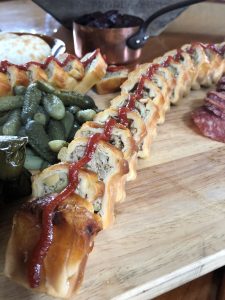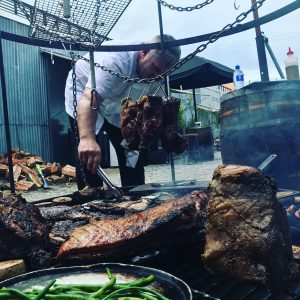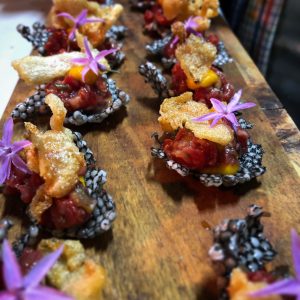An Article from Cook Concern
An Article from Cook Concern
This article was originally published by Cook Concern.
Jerome Dalton is an executive chef at Dalton Hospitality in Brisbane Australia. We spoke with him about Australian cuisine and what’s new to experience.
Today you are an Executive Chef at Dalton Hospitality, in Brisbane Australia. How did it all start, what motivated you to enter the culinary world?
I grew up in Tasmania (one of Australia’s first settlements) before it was cool. My grandmother was a brilliant cook and cooked professionally for government officials in Hobart so naturally i was always surrounded with incredible seafood, beef, lamb and produce on an island known for its natural abundance. It was quite normal where I grew up to catch as many fish, scallops and crayfish as we needed without too much work.
Tell us the story of starting out as a chef
I won’t bore you with a “media” version of events as the truth is I was a bit of a troubled youngster and a complete smarts arse at school.
Only my home economics/cookery teacher trusted me enough to send me out for work experience to represent the school and she decided for whatever reason that I would do well in a fast-paced stressful environment like a high- end kitchen, so at the age of 14 I started work as a chef’s assistant in one of Hobart’s oldest and most respected restaurants, “Dirty Dicks”.
Before you laugh, the restaurant was in Tasmania’s first post office building where it was said that the first postmaster of Hobart, Richard (Dick) had sent to London for his wife and had a made a feast ready for her arrival when he was told the ship she was on was sighted in the Derwent river but the ship went down and she was lost.
The story went that Dick refused to accept this news and wouldn’t let anyone clear the table of the celebration feast and eventually died there waiting for his beloved wife.
Great story, not sure how much of it is true but I can say that the place heaved! It was hot, stressful, fast and I loved it.
I worked there through school then started my apprentice as a chef.
If she had known I only joined that class because there were more pretty girls in it than any other…
What will you never forget about your time as young chef?
It was brutally hard work, we never had a roster, never had time sheets or hours we just turned up ready to work 15 minutes prior to our shift and gave it 110% day in and day out for 10-16 hours a day.
I’ll never forget knowing that the only reason I had a job was that no one better had waked in yet and every time I saw a resume I knew it was my position on the line.
We worked and played very hard and it was fantastic.
What is the best part of being a chef?
There are so many positives to being a chef but for me the life-long journey of learning is the best part.
Even the best in the world can never know all there is to know about food and wine.
It has allowed me to travel the world, eat in the best restaurants and back streets, taste the world’s best wines and see the most incredible places and people.
No other job could have done that.
And what is the hardest part of the chef job?
Watching the quality of food in my industry slowly being degraded by social media and cost of business hurts.
After working your way through the ranks to head chef at numerous high-end establishments, you started your own catering business. How did you come up with this idea and how was the first famous critical year?
It was purely by accident. I was asked to cater for a regular Client of a French bistro I was consultant chef for back in 2002.
I catered a diner party in his house (more of a mansion really) and so was born the company that has become Dalton Hospitality Bespoke events.
Over the past years, Dalton Hospitality has grown from a small one-man operation into one of Brisbane’s premier catering companies by maintaining and never accepting anything but absolute quality. What else is the key to your success?
In a word – people. We invest heavily in our suppliers, crew and the Industry as a whole. One thing I learned is that the ”team” is founded on milk crates out the back after a tough service. We all have each others backs, all carry each other through the tough times and work together.
How innovative can you be/must you be to be successful in today’s catering world?
It can be frustrating seeing terrible trends come and go. I can say I have never served a drink in a mason jar or a meal in a mini fry basket! When we innovate its a natural process that happens with great respect for traditional cuisine and values.
You are well known for so many different venues, as rainforest gardens, airplane hangers, yachts and barns. Is there a venue in your mind and dreams, which you have not yet realised?
I think we have catered almost every conceivable location over the past 12 years from secluded beaches, super yachts to a secret picnic for 20,000. A long table dinner on a jetty for 750 guests, underground reservoirs to a table of 2 in a backyard.
From the queen to our homeless BBQs and everything in between but I’m always open to the next challenge and the next location. If you hear of anything I’m in!
How innovative do you need to be within today’s catering business?
We still hold true to the belief that classics are classics for a reason so will never head out to change a classic dish. However, innovation comes from our love of travel and food cultures.
As I write this email, my head chef Luke and I have spent 4 days working on 2 new canapés.
From inception to delivery (if they make the cut) there has been 90 hours of trial and thought that have gone into just those 2 canapés.
With your different clients, functions and locations, you need to cover a wide culinary range and Know-How. How difficult is it to maintain such a wide culinary range?
It’s amazing! We love the challenge of learning new dishes and it helps us create a fantastic environment for our apprentice chefs to learn and grow through constantly changing menus.
Your success is great from outside. What is the hardest part at the catering business?
The balance between budgets and delivery is always the hardest. For the most part our clients understand that we are the best and that quality can cost a little more. The other difficulty is the location restrictions, we sometimes endure extreme heat or rain with outdoor events, lack of equipment, distance etc. It can be challenging to say the least to deliver 5 courses of restaurant- quality food for 200 guests in a cow paddock.
As Managing Director of Dalton Hospitality, how much time do you have to still work as a chef?
As often as I can. We have an amazing crew of industry professionals from all over the world and in 12 years have only had 4 head chefs but the kitchen is my happy place. If we are cooking great food then that’s where I love to be.
Can you share some of your latest, innovative creations with us?
The latest toy is a fire dome I designed with help from my good mate and chef Zeb Gilbert (Wasabi Noosa). I approached a welder and had him make up a huge 3-ringed steel dome we use to cook over a raging fire. We work with welding gloves, hooks and chains to roast whole primal cuts and vegetables for outdoor events. The fire takes 6 hours to build up and the flavours are amazing.
Lots of foreign chefs are interested to work in Australia. Is it difficult to find a chef job in Australia? Do you offer chef jobs for foreigners?
Yes absolutely! We offer work to anyone who is passionate about food and not too full of ego to be part of a team. Currently we have 6 different nationalities in the business.
So far you have been very successful as Chef and Managing Director. What else is on your “to do list” as chef/ culinary entrepreneur?
I’ve owned successful restaurants, bars, cafes, a hotel and the catering company but next on my ”to do” list is a Charcuterie bar and a range of products. After 20 years of trial and error I have finally figured out my fermented Chinese chilli oil Recipe and made 300 kg of it to lay down for 24 months before its ready to eat. I would love the opportunity to make some high quality sauces and rubs commercially.
Which ingredients, recipes and cooking techniques reflects Australian soul best?
We are so lucky here in Australia to have a huge range of climates from snow and frost to 50 C deserts and tropical areas. This coupled with the incredible melting pot of human movement has created what I believe is one of the most culturally diverse Culinary situations in the world today. For me it has always been European kitchen training but with a huge range of cultures.
First it was English, Italian, French, German, then Spanish and Chinese, and the past 15 years the South East Asian foods have flourished. We seem to be moving towards middle eastern and Korean cuisine this year and of course Japanese foods are also strong.
Understanding of Australian Native cuisine also continues to grow slowly. The answer is all of them! We are so incredibly lucky here.
What does work mean for you?
Passion, obsession.
What is most important in your life?
My wife and 2 beautiful children, nature, food, and travel. If I could have all of these in one place at one time I would be a very happy man.
What do you do if you want to treat yourself to something special?
Champagne! I love to eat charcuterie and drink Champagne. Off road 4×4 driving in remote places.
What would you do if you wouldn’t have to worry about your income for one year?
I would pack up my family, buy a yacht and eat in as many ports and coastal towns as I could fit into 12 months. Fishing, eating, swimming, cooking on fire and exploring cultures, bliss!






